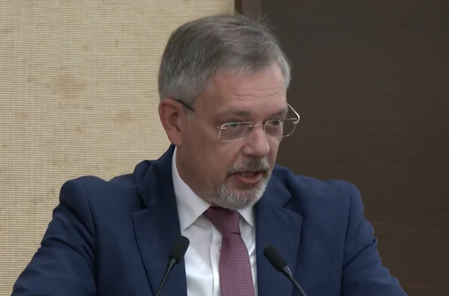Headlines
Global North's attempts to impose sanctions, tariffs highlight reluctance to multipolar world: Russian envoy Denis Alipov

New Delhi, Oct 16
Russian Ambassador to India Denis Alipov on Thursday criticised the "so-called Global North" for attempting to maintain its dominance through neo-colonial practices, unilateral sanctions, and trade wars, saying such actions only expose its unwillingness to acknowledge the emergence of a multipolar world order.
Speaking at the 25th India-Russia Strategic Partnership event, Alipov lauded the enduring bond between India and Russia, describing it as an "equal and mutually beneficial" relationship built on a strong foundation of trust and respect.
He said that the bilateral partnership has been a "driving force of global growth" and stands as proof that the national interests of both countries are deeply interconnected.
"The relationship between India and Russia has always been equal, uninterrupted and mutually beneficial, built on a solid foundation of trust and respect, qualities that make its upward trajectory irreversible," he said.
Alipov emphasised that the 25 years of India-Russia strategic partnership have shown how cooperation between the two nations has contributed significantly to global stability and progress.
"This kind of relationship is in increasing demand worldwide, as we collectively navigate an era of unprecedented geopolitical turbulence," he noted.
Slamming the Global North, he said, "The attempts by the so-called Global North to impose neo-colonial unilateral approaches, including legal sanctions and tariffs, and to provoke conflicts and trade wars in order to maintain dominance, only highlight its reluctance to accept the emergence of a multipolar world."
He added that such measures obstruct long-overdue reforms in global governance and hinder the recognition of the growing influence of the Global South in shaping international economic and political dynamics.
"Such actions also obstruct long-overdue reforms of global governance and the recognition of the growing role of the Global South in shaping the international economic and political landscape. In this context, the relevance of such platforms as BRICS and the SCO, both of which promote pragmatic, depoliticised cooperation and help reduce external dependencies, is naturally rising," he said.
The Russian envoy highlighted the growing importance of multilateral groups like BRICS, saying that its expansion reflects the increasing aspirations of developing nations.
"In recent years, BRICS has experienced a surge in popularity across the Global South. With its membership doubling, it fosters comprehensive dialogue grounded in the universal principles of the UN Charter and international law -- the only sustainable basis for building trust, finding durable solutions, and creating favourable conditions for shared prosperity," he added.
On economic cooperation, the envoy underlined that Russia continues to play a key role as a leading supplier of energy resources, fertilisers, and agricultural products to India, helping minimise risks in their economic engagement.
"We have developed independent payment mechanisms based on national currencies and established alternative connectivity routes -- the International North-South Transport Corridor, the Vladivostok-Chennai corridor, and the Northern Sea Route," he said.
Alipov further stated that the India-Russia partnership serves as a model of stable, balanced, and mutually respectful international cooperation -- one that aligns with the aspirations of an increasingly multipolar and inclusive global order.







































